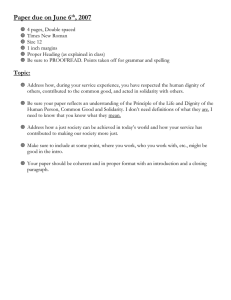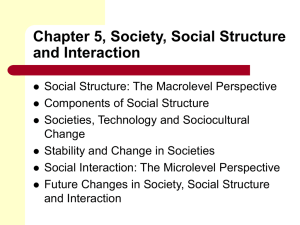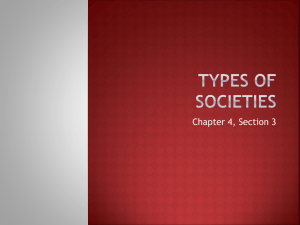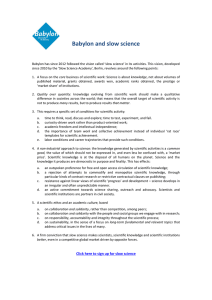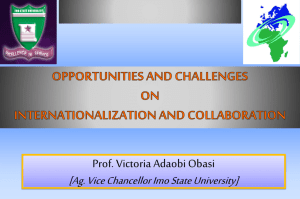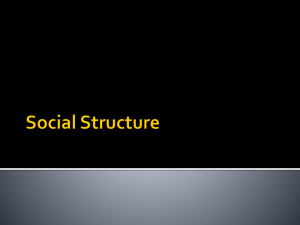THE CHALLENGE OF INTERNATIONAL SOLIDARITY AND THE RIGHT TO DEVELOPMENT
advertisement
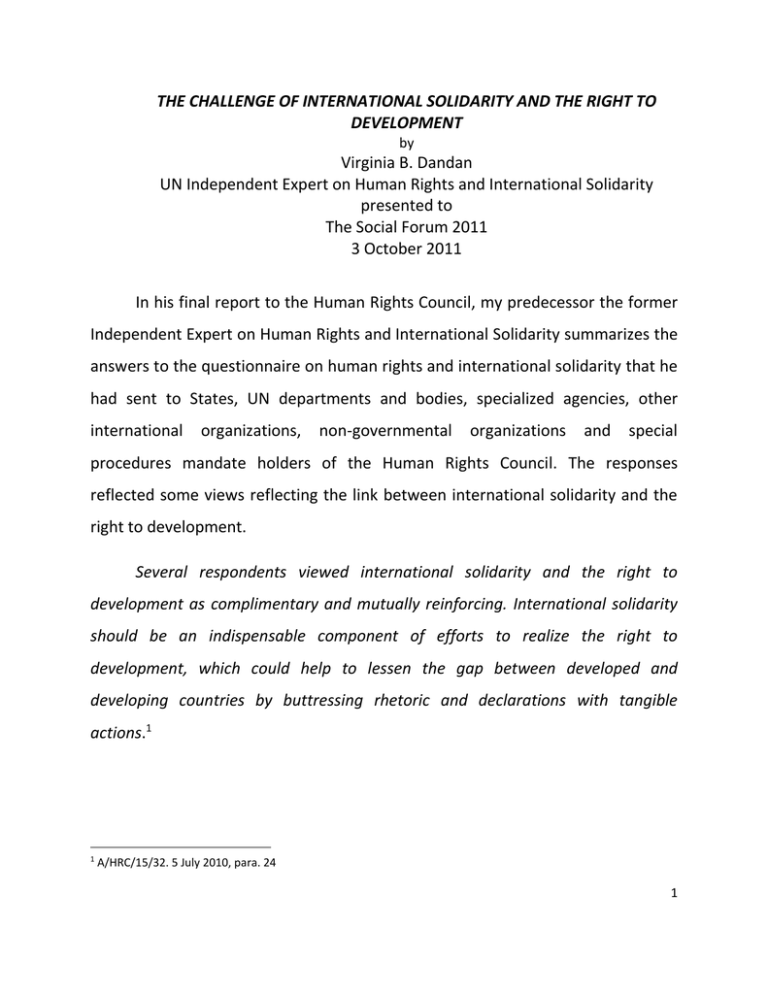
THE CHALLENGE OF INTERNATIONAL SOLIDARITY AND THE RIGHT TO DEVELOPMENT by Virginia B. Dandan UN Independent Expert on Human Rights and International Solidarity presented to The Social Forum 2011 3 October 2011 In his final report to the Human Rights Council, my predecessor the former Independent Expert on Human Rights and International Solidarity summarizes the answers to the questionnaire on human rights and international solidarity that he had sent to States, UN departments and bodies, specialized agencies, other international organizations, non-governmental organizations and special procedures mandate holders of the Human Rights Council. The responses reflected some views reflecting the link between international solidarity and the right to development. Several respondents viewed international solidarity and the right to development as complimentary and mutually reinforcing. International solidarity should be an indispensable component of efforts to realize the right to development, which could help to lessen the gap between developed and developing countries by buttressing rhetoric and declarations with tangible actions.1 1 A/HRC/15/32. 5 July 2010, para. 24 1 The right to development mandates fostering just global social and economic arrangements and a sense of human solidarity among all peoples.2 In the same report, the value and significance of international solidarity in an interdependent world is underlined, indicating how it may eventually guide the progressive development of international law on human rights and international solidarity. If indeed international solidarity and the right to development are complimentary and mutually reinforcing it should be fairly easy to see the link between international solidarity and the right to development, for example, their convergence on international cooperation among others. The challenge lies in identifying what distinguishes international solidarity from the right to development, bearing in mind some previously identified overlapping components, including in relation to international law and policy on sustainable development, poverty alleviation and cooperation for development. In my own view, solidarity is a persuasion that combines differences and opposites, holds them together into one heterogeneous whole, and nurtures it with the universal values of human rights. International solidarity therefore does not seek to homogenize but rather, to be the bridge across these differences and opposites, connecting to each other diverse peoples and countries with their heterogeneous interests, in mutually respectful, beneficial and reciprocal relations, that are imbued with the principles of human rights, equity and justice. 2 Ibid. Para.26 2 I expressed this view in my first statement to the Human Rights Council during its recently concluded 18th Session. I say it again today to stress the following notions: that international solidarity should be viewed in its broadest sense, that it is about respecting diversity, it is about connecting peoples, it is about oneness and accord despite differences, and it is about human rights as the binding force securing heterogeneous parts together. If we can agree that international solidarity connects diverse peoples, cultures and countries into a harmonious whole, informed by human rights in meaningful ways, I believe there should not be any doubt that international solidarity is itself a human right. That question is still being debated as we gather here, commemorating the twentyfifth anniversary of the Declaration on the Right to Development. There is considerable acceptance of international solidarity as a moral principle, but the concept of international solidarity as a human right faces varying degrees of opposition, from scepticism to categorical objection. This echoes the climate surrounding the right to development before it was finally proclaimed in a declaration twenty-five years ago, but from all indications, the debate has not been fully resolved. It is ironic that within the United Nations itself—the primary and supreme space that exists solely for the exercise of the right to international solidarity—there are insistent voices proclaiming that such a right does not exist. Nonetheless, in reference to my mandate, I have already committed to deliver to the Human Rights Council a draft declaration on the right of peoples and individuals to international solidarity before the end of my initial term in 2014, three years from now. In June of next year 2012, an expert workshop will be convened to define guidelines and principles on the fulfilment of the right to 3 international solidarity. Along with recognized experts in their respective fields, relevant special procedures mandate holders will be present to provide input based on their expertise. That workshop will also be an opportunity for further dialogue on outstanding issues and gaps such as the gender implications of international solidarity, as well as the impact of the right to international solidarity on achieving the Millennium Development Goals. It will also occasion a meeting of the minds on points that have been raised between the arguments for and contrary to, the concept of the right to international solidarity. To put it simply, aside from mapping what will consequently become a draft declaration, the expert workshop will establish the right to international solidarity within the human rights discourse. Prior to that workshop, it is my intention to engage with the Advisory Committee of the Human Rights Council, at its next session in February, for the purpose of formal discussions and informal consultations, regarding its expected input to the draft declaration, in accordance with a Council resolution mandating it to do so. Interacting with the treaty bodies is important, in particular the Committee on Economic, Social and Cultural Rights. Having been a member of that treaty body for two decades and its former Chairperson, I am aware of the significance the Committee attaches to international cooperation, which it views as an obligation of States. In addition and if time allows, I would like to study and observe firsthand through country visits among other things, how best practices identified in the reports of my predecessor actually work on the ground, and how aid effectiveness is ensured in practice particularly in terms of achieving development goals. In my experience, the reality on the ground can be very different from what written reports describe. 4 Whenever possible, I will participate in relevant seminars, conferences and other gatherings such as this, in order to address what has been an apparent lack—a consciousness and familiarity with, and an understanding of, human rights and international solidarity, and just as importantly, to listen attentively and learn from diverse views regarding this right. Location, time and financial constraints, will not make possible the participation at that expert workshop, of all the persons whose wisdom, expertise and advise would be of great value to my mandate. Within my own limited means but with the assistance of, and in solidarity with others, high on my agenda will be to explore possible ways by which these minds can be brought together to reflect on the meaning and ramifications of the right to international solidarity. I would point out and stress that poverty, water scarcity, population pressure, the adverse social and economic effects of globalization including its impact on labour and migration, as well as the misuse of natural resources that is closely linked to increasing social conflict, marginalization and poverty, are but some of the most serious constraints to a sustainable future during this century. These stark realities reinforce the argument for the elaboration of the right to international solidarity, and for judiciously moving forward without further delay, to reach an agreement on its contours, configuration and substance, as will be articulated in a draft declaration on the right of peoples and individuals to international solidarity. It is important that the following will be examined within the context of the right to international solidarity: peace and security; international cooperation focusing on aid effectiveness, trade, investments, foreign debt, extraterritorial obligations of States and the issue of corruption; environment and natural resources including among others, access to energy, management of water systems, food 5 systems, health systems and land systems; climate change, disaster reduction, emergency aid and reconstruction; and global governance addressing social protection, labour and migration. The list is long but it is not exhaustive, merely serving to illustrate the panoply of issues that compete for urgent attention. Nevertheless, it is anticipated that the workshop will simplify without diminishing the substance of international solidarity. At the end of the day, it is envisioned that the right to international solidarity will construct an enabling environment for the realization of the right to development. My particular interest in the right to development at this point in time naturally arises from my mandate on human rights and international solidarity. In seeking to configure the contours of the right to international solidarity, the point of departure will be the elements that it has in common with the right to development, such as the principles contained in the UN Charter, the various international human rights treaties in particular the International Covenant on Economic, Social and Cultural Rights, international cooperation and the commitments made by States in various international conferences, including the Millennium Declaration Goals especially MDG8: to establish global partnerships. On a more personal level, allow me to share with you how my enduring interest in the right to development that goes many years back, has been shaped to a large extent by the experience of being a long-time member of the Committee on Economic, Social and Cultural Rights, as well as from my continuing human rights work on the ground with indigenous peoples in my country, with the Philippine national human rights institution, local NGOs, community organizers, and local government units. 6 My own view of how the right to development is implemented by States is within the framework of the provisions of the International Covenant on Economic, Social and Cultural Rights, particularly article 1 that protects the right of peoples to freely determine their political status and freely pursue their economic, social and cultural development, as well as article 2 outlining the nature of the obligations of States including the duty to provide international assistance and cooperation. The implementation by States of their Covenant obligations are the basis of a constructive dialogue between Committee members and State delegations, a question and answer method that provides the opportunity to delve deeper into details focusing on the progress achieved and the obstacles and difficulties encountered. During each session, international and non-governmental organizations engage with the Committee orally and in writing, providing detailed information on the actual situation on the ground. Oftentimes the information provided by States in their report and during the dialogue, and information received from these international and non-governmental organizations and other members of civil society, do not correspond. It has been my good fortune and privilege that my international level perspective is enriched and balanced by the human rights in development work that I continue to do with grassroots communities. I have seen the view as described verbally in dialogues with State delegations along with written reports, as well as the reality as lived by people in grassroots communities far removed from Geneva. One end of the spectrum to the opposite end, is a world apart, reflecting the disconnect between policy and practice. 7 It is critical that we listen to the voice of peoples so that policy can be informed by their genuine participation, which is the essence of the right to development. Human aspirations for development and well-being belong to real people. There is a need to go beyond our expectations and taken-for-granted assumptions about what those aspirations are and to seek to learn and understand how development and well-being are defined by people themselves. Obligations arise between peoples by virtue of the global social and economic processes that connect them across national jurisdictions, requiring a conception of responsibility that recognizes this connection. The achievement of the Millennium Development Goals and the realization of the right to development, call for a more enlightened approach, mindset and action based on a sense of community and international solidarity. The need for change is underlined by the Millennium Declaration, which includes solidarity and shared responsibility as fundamental values essential to international relations in the twenty-first century.3 The idea of the right to development is twenty-five years old today, meaning that one generation has passed and another begins. Right to development is growing old and tired, weighed down by too many words, plans and policy measures whose very complexity ensures incoherence leading to inaction. The lip service has only served to weaken it and that may eventually render it meaningless. Right to development at the international level is all good intentions and commitments and these are important to keep it alive. But let us 3 United Nations General Assembly. A/HRC/15/32. 5 July 2010 8 not wait another generation to renew our efforts to make the right to development work. Let us undertake the imperative of change with the sobering and honest recognition that the mostly intellectual initiatives over the past twenty-five years have not brought us that far forward in giving effect to the right to development, with all due respect for those who have been working so hard and selflessly on these initiatives. Let us translate all those words into action. Let us look for that breath of fresh air that the right to development sorely needs, and this time let us look in the proper places. We have much to learn from everyday people, who live their lives in community, who address their problems and who eventually find solutions, coming together in solidarity, in the exercise of their right to development. ___________________________________________________________ 9
